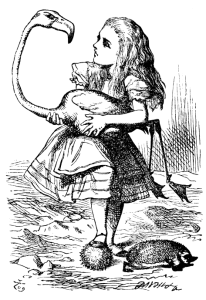
Illustration from AAIW by John Tenniel
I’m grateful to friend and author Marnie Cate for inspiring this post and hosting it on her lovely website a few weeks ago. When I first visited Marnie’s site, I noticed that her work concerns magic and the paranormal. I had to admit off the bat that, by contrast, I am primarily drawn to realism. However, I do NOT claim to have any better grasp of “reality” than writers of other genres. To me, realism in fiction basically means that, “Things may get weird, but no supernatural forces will be blamed.”
I’m not sure when the realist bug bit me so hard. Earlier in life, my favorite books were The Chronicles of Narnia, The Fellowship of the Ring, and Alice in Wonderland. A long detour through Russian literature may have done it (which is why I call myself a “recovering academic”). The 19th-century Russian novels of Tolstoy, Turgenev, and Dostoevsky are often classed as a “golden age of realism.”
Nonetheless, I love flashbacks, dream sequences, and the mysteries of nature—these can all be excellent elements in fiction, in my opinion. In fact, there is one key element in my new novel, Our Orbit, that doesn’t fit the realist mold.
One of the main characters in my novel is a young girl named Miriam, who has the misfortune of witnessing her father’s arrest by a SWAT team. Terrified, she hides under her parents’ bed, expecting US Marshals to come for her next. Of course, she does not understand that they will take her not to jail but to a foster home. Nonetheless, while she trembles in hiding, something strange takes place —
…the light switch clicked by the door of Daddy’s bedroom. Miriam tried to sink into the floor. Light reached for her under the edge of the sheet. …she saw dark boots in the doorway.
“Hey,” said the man’s voice. “You playing hide-and-seek in here? You can come out now, okay?”
He sounded young. Not so mean as the others. Miriam snuffled, wiped her face on her sleeve. She knew it would tell him she was under the bed.
His knees crackled when he bent down. “Come on,” he said, almost beside her now. “Don’t be so scared. We’re not here to hurt you.”
The miracle wasn’t that his voice sounded kind. The miracle was that his voice called up another, a voice Miriam had been the last person on earth to hear. Her daddy had said many times, “Miriam was with her when she died.” And Isaac said, “You know, Miriam, you were the last person to talk to Momma alive.” So now she heard her mother again, almost like the breath of someone sleeping beside you in a warm bed on a winter night—
Now is a time to be very brave. This man is not going to harm a child, I promise you that much. And no more bad things will happen tonight. You will go to a good and safe place.
Things may get weird, but no supernatural forces will be blamed…
Throughout the conflicts that develop in the story, Miriam continues to hear the voice of her deceased mother. I think it becomes clear that this is a source of comfort and guidance for her, almost as if her mother were still there. When my beta readers considered these episodes, a few said that I should explicitly clarify whether Miriam’s own psychology was causing this voice, or if it was intended to be a paranormal phenomenon.

Guardian angel….
Like most writers, I think, I was reluctant to ‘cut and dry’ the mystery. The question of whether the spirit of Miriam’s mother literally speaks to her in times of trouble remains open. In my opinion, the story lends itself a bit more to one interpretation than the other, but I hope readers will find the meaning that speaks to them.
~ ~ ~ ~

Visit author Marnie Cate and connect with her on Facebook, on Twitter, and Goodreads. Find her book, Remember, Protectors of the Elemental Magic on Amazon.
~ ~ ~ ~
Thank you for visiting my blog today! Please check out the rest of the website and let me know if you like what you see, or if you have suggestions. You can reach me by leaving a comment in the box below or by clicking the Contact link at upper right (or just click here). Consider subscribing to my blog or newsletter. And stop by again soon!
